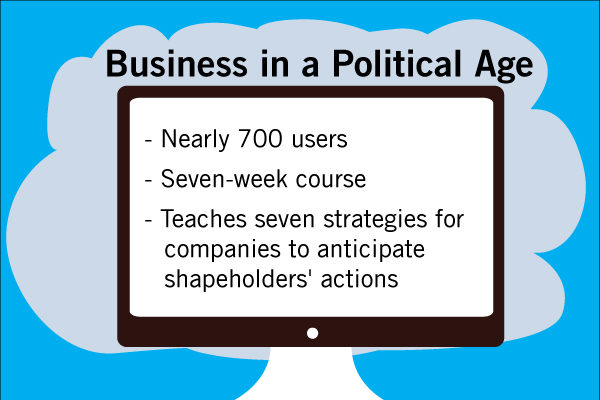Enrolling in GW is no longer a requirement to take a course in the Graduate School of Political Management.
GSPM launched its first massive open online course last month and the school’s director said he hopes the free lessons will encourage more students to join the program, signaling the school’s shift toward marketing its degrees. That shift comes after the school saw a 30 percent enrollment dip in its master’s degree in political management from 2010 to 2013 and after GW saw an overall decline in the graduate enrollment.
Mark Kennedy, director of GSPM, said in an interview last month that enrollment had hit nearly 700 users for his course “Business in a Political Age” — a major milestone for a school whose most popular degree had fewer than 200 students last year. He said the goal of the course is to bring more students into the school, which offers both online and on-campus classes, by highlighting its strengths in politics and business.
“The idea is to let people have a taste of it,” Kennedy said. “If they like it and they want more, the goal would be that some slice of these people coming in through the MOOC is going to say, ‘Maybe I ought to get my degree from GW. Maybe I ought to get my degree from GSPM.’”
The course outlines seven ways for businesses to engage with the what Kennedy calls “shapeholders,” or outside companies and organizations that can impact business activity. The most successful businesses can anticipate other organizations’ decisions and accurately size up situations before taking action, he said.
“Anything going on in the political sphere is obviously something you’d expect GW to be good at,” Kennedy said. “We’re wanting to run them through, get the concepts and, as we say, hope that in the end they want more.”
The course has rolled out a new session each week centered on a specific topic such as how to engage with other organizations effectively since it launched at the beginning of last month. Each session walks users through a seven to eight-minute-long video, a case study and a short reading before launching users into a discussion about the topic, Kennedy said.
Once all the sessions are available online, Kennedy said they’ll remain online indefinitely so students can take the course at their leisure.
“It’s our intent to make that more of a Netflix after that,” Kennedy said. “So if you wanted to do all seven weeks in one night, if you really wanted to binge, you can do that.”
Kennedy added that users can give feedback at the end of the seventh week and he and his team will use that feedback to rework the course.
Experts say MOOCs offer a more interactive learning experience compared to those of books and videos, but still aren’t as advantageous as an in-person class, meaning they may work better as a marketing tool than an actual learning experience.
Lynne O’Brien, the associate vice provost for digital and online education initiatives at GW’s peer school Duke University, said in an email that universities nationwide are using MOOCs “to increase awareness of other kinds of course offerings, including credit courses, executive education or online degree programs.”
She said these online courses also have the potential to reach people who might not otherwise consider taking courses at a university like international students interested in the school or people with schedules that are too full to take classes for credit.
“If you are looking for more students or a different mix of students in your regular programs, MOOCs might help with that,” she said.
GW launched its first MOOC on the coding language Python this fall. Lorena Barba, an associate professor of mechanical and aerospace engineering, helped to create the course with professors from three other universities from across the globe.
The University offers another MOOC in public policy launched by Frank Sesno, the director of the School of Media and Public Affairs, with a handful of faculty and another on the history of the Federal Reserve. GW Law School plans on releasing one on patent law in January, according to GW’s online learning website.
Peter Shea, the associate provost for online learning at the State University of New York at Albany who has taught for-credit online courses, said MOOCs at high-profile universities can have enrollments as high as five figures. Harvard University and the Massachusetts Institute of Technology have the world’s most popular MOOCs, covering topics like abstract algebra and introductory computer science.
He said the “increase in access to these very elite institutions” has created “quite a splash” in online learning, but that using them as a marketing strategy is complex. But, he said an MOOC must also appeal to a general audience to have the largest impact.
“I think there is a general impression that there is an outreach opportunity represented by massive open online courses,” Shea said.








